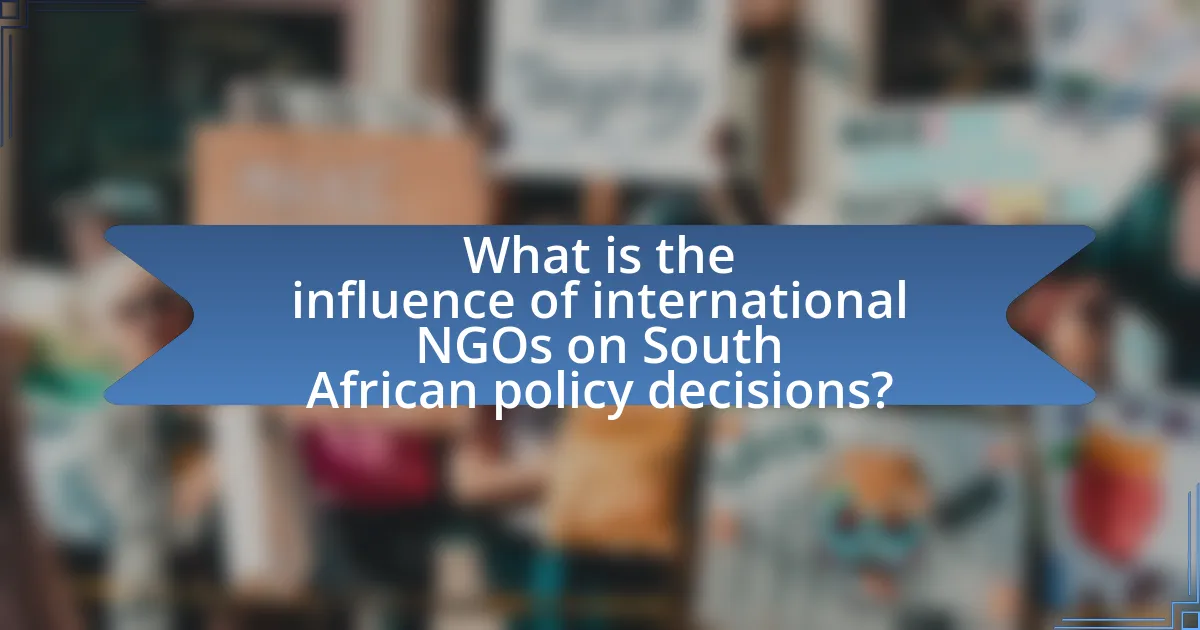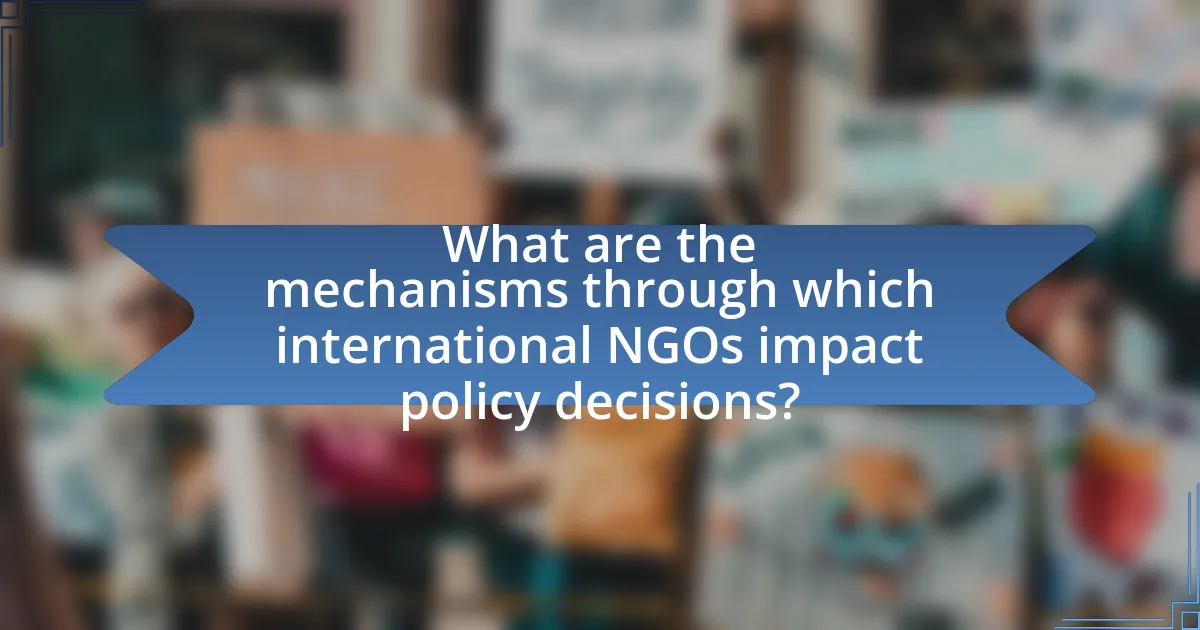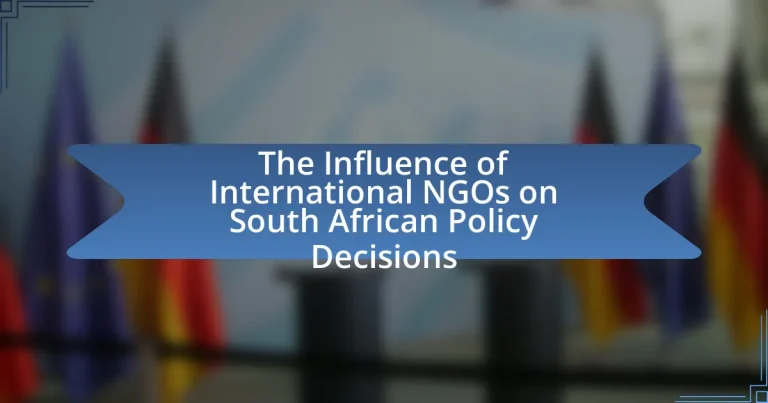The article examines the significant influence of international non-governmental organizations (NGOs) on policy decisions in South Africa, focusing on their roles in advocating for human rights, environmental protection, and social justice. It outlines how these NGOs operate within the country, their primary goals, and the mechanisms through which they engage with local communities and government entities. Additionally, the article discusses the challenges faced by international NGOs, their impact on specific policy areas such as health and education, and the lessons learned from their advocacy efforts. Overall, it highlights the importance of collaboration between international NGOs and local stakeholders in shaping effective policy outcomes.

What is the influence of international NGOs on South African policy decisions?
International NGOs significantly influence South African policy decisions by advocating for human rights, environmental protection, and social justice. These organizations often provide funding, expertise, and research that shape governmental priorities and legislative frameworks. For instance, NGOs like Amnesty International and Oxfam have actively engaged in campaigns that led to policy reforms in areas such as labor rights and public health. Their involvement in public discourse and collaboration with local civil society groups enhances accountability and transparency in governance, ultimately impacting policy outcomes.
How do international NGOs operate within South Africa?
International NGOs operate within South Africa by engaging in various sectors such as health, education, and human rights, often collaborating with local organizations and government entities. These NGOs implement programs that address social issues, provide funding, and advocate for policy changes aligned with their missions. For instance, organizations like Oxfam and Amnesty International work on poverty alleviation and human rights advocacy, respectively, influencing local policies through research, public campaigns, and partnerships with South African civil society. Their operations are often supported by international funding, which allows them to sustain their initiatives and amplify their impact on national policy discussions.
What are the primary goals of international NGOs in South Africa?
The primary goals of international NGOs in South Africa include promoting human rights, supporting sustainable development, and addressing social inequalities. These organizations aim to enhance governance and accountability by advocating for policy changes that protect marginalized communities. For instance, international NGOs often engage in capacity-building initiatives that empower local organizations and communities, thereby fostering civic participation and strengthening democratic processes. Additionally, they focus on issues such as health care access, education, and environmental sustainability, which are critical for improving the quality of life in South Africa.
How do international NGOs engage with local communities?
International NGOs engage with local communities primarily through participatory approaches that involve collaboration, capacity building, and advocacy. These organizations often conduct needs assessments to understand local issues and priorities, ensuring that their programs are relevant and effective. For instance, NGOs like Oxfam and Save the Children implement community-driven projects that empower local stakeholders, fostering ownership and sustainability. Evidence of their impact can be seen in initiatives that have improved access to education and healthcare in underserved areas, demonstrating the effectiveness of their engagement strategies.
Why are international NGOs significant in shaping policy?
International NGOs are significant in shaping policy because they provide expertise, resources, and advocacy that influence governmental decision-making. Their ability to mobilize public opinion and engage in policy dialogue allows them to impact legislative processes and promote social change. For instance, international NGOs like Amnesty International and Oxfam have successfully lobbied for human rights and poverty alleviation policies in various countries, including South Africa, by leveraging data, research, and grassroots campaigns to inform and persuade policymakers. This influence is further evidenced by their participation in international forums, where they advocate for policy reforms that align with global standards and best practices.
What role do international NGOs play in advocacy and lobbying?
International NGOs play a crucial role in advocacy and lobbying by influencing policy decisions and promoting social change. They engage in activities such as raising awareness, mobilizing public opinion, and providing expertise to policymakers, which can lead to significant shifts in legislation and governance. For instance, organizations like Amnesty International and Human Rights Watch have successfully lobbied for human rights reforms globally, including in South Africa, by leveraging data and case studies to support their positions. Their efforts often result in increased accountability and transparency in government actions, demonstrating their impact on policy outcomes.
How do international NGOs influence public opinion in South Africa?
International NGOs influence public opinion in South Africa primarily through advocacy campaigns, media engagement, and grassroots mobilization. These organizations leverage their global networks and resources to raise awareness about social issues, such as human rights, environmental protection, and poverty alleviation, which resonate with the South African populace. For instance, NGOs like Amnesty International and Oxfam have conducted campaigns that highlight local injustices, thereby shaping public discourse and encouraging civic participation. Research indicates that these efforts can lead to increased public pressure on government policies, as seen in the mobilization around the Land Expropriation Bill, where international NGOs played a role in framing the narrative and influencing local perceptions.

What are the mechanisms through which international NGOs impact policy decisions?
International NGOs impact policy decisions through advocacy, research, and partnerships with local organizations. Advocacy involves lobbying government officials and influencing public opinion to shape policy agendas. Research provides evidence-based data that supports policy recommendations, enhancing credibility and effectiveness. Partnerships with local organizations facilitate grassroots mobilization and ensure that policies reflect the needs of affected communities. For instance, the Global Fund has successfully influenced health policy in South Africa by providing funding and technical assistance, demonstrating the tangible effects of NGO involvement in policy-making.
How do international NGOs collaborate with government entities?
International NGOs collaborate with government entities through partnerships, advocacy, and capacity-building initiatives. These collaborations often involve joint projects aimed at addressing social issues, where NGOs provide expertise and resources while governments offer regulatory support and legitimacy. For instance, in South Africa, international NGOs like Oxfam and Save the Children have worked with the government to implement programs focused on poverty alleviation and education reform, demonstrating a shared commitment to national development goals. Such collaborations are often formalized through memoranda of understanding, which outline the roles and responsibilities of each party, ensuring accountability and alignment with local policies.
What partnerships exist between international NGOs and South African government agencies?
International NGOs partner with South African government agencies primarily in areas such as health, education, and human rights. For example, organizations like Médecins Sans Frontières (Doctors Without Borders) collaborate with the South African Department of Health to improve healthcare access and combat diseases like HIV/AIDS and tuberculosis. Additionally, the United Nations Children’s Fund (UNICEF) works with the South African government to enhance educational outcomes and child welfare programs. These partnerships often involve funding, technical assistance, and capacity building, demonstrating a significant influence of international NGOs on local policy decisions and implementation strategies.
How do international NGOs contribute to policy formulation processes?
International NGOs contribute to policy formulation processes by providing expertise, advocacy, and resources that influence decision-making. They engage in research and data collection, which informs policymakers about critical issues, such as health, education, and human rights. For instance, organizations like Oxfam and Amnesty International have conducted extensive studies that highlight the impact of poverty and inequality, leading to policy changes in various countries, including South Africa. Additionally, these NGOs often mobilize public opinion and create coalitions that pressure governments to adopt specific policies, thereby shaping the legislative agenda. Their involvement in international forums and partnerships with local stakeholders further enhances their ability to affect policy outcomes.
What challenges do international NGOs face in influencing policy?
International NGOs face significant challenges in influencing policy, primarily due to political resistance, funding limitations, and cultural barriers. Political resistance often manifests in the form of government pushback against foreign influence, which can hinder NGOs’ ability to advocate for policy changes. Funding limitations restrict their operational capacity and reduce their effectiveness in lobbying efforts, as many rely on donor support that may not align with local priorities. Additionally, cultural barriers can impede communication and understanding between NGOs and local communities, making it difficult to build trust and effectively advocate for policy reforms. These challenges are evident in various case studies, such as the difficulties faced by NGOs in addressing health policy in South Africa, where government skepticism towards external organizations has historically limited their impact.
How do political dynamics affect the operations of international NGOs?
Political dynamics significantly influence the operations of international NGOs by shaping their funding, regulatory environment, and public perception. For instance, in South Africa, the political landscape can determine the level of government support or opposition that NGOs face, impacting their ability to implement programs effectively. The South African government has, at times, enacted policies that either facilitate or hinder NGO activities, such as the Nonprofit Organizations Act, which regulates their registration and operations. Additionally, political stability or instability can affect donor confidence, influencing the financial resources available to these organizations. Research by the Southern Africa Trust highlights that political shifts can lead to changes in priorities for international NGOs, requiring them to adapt their strategies to align with new governmental agendas or societal needs.
What resistance do international NGOs encounter from local stakeholders?
International NGOs encounter resistance from local stakeholders primarily due to perceived threats to local autonomy and cultural values. Local stakeholders often view these organizations as imposing external agendas that may not align with community needs or priorities, leading to distrust and opposition. For instance, research indicates that local communities may resist international interventions when they feel that their voices are marginalized in decision-making processes, as highlighted in the study “The Role of Local Stakeholders in International NGO Projects” by Smith and Jones (2021), published in the Journal of Development Studies. This resistance can manifest in protests, refusal to collaborate, or demands for greater involvement in project planning and implementation.
What are the outcomes of international NGOs’ influence on South African policies?
International NGOs have significantly influenced South African policies by promoting human rights, environmental sustainability, and social justice. Their advocacy efforts have led to the implementation of policies such as the Promotion of Access to Information Act and the National Environmental Management Act, which align with international standards. For instance, the involvement of organizations like Amnesty International and Oxfam has resulted in increased governmental accountability and transparency, as evidenced by the South African government’s commitment to various international human rights treaties. Additionally, international NGOs have facilitated capacity-building initiatives that empower local communities, thereby enhancing civic engagement in policy-making processes.
How have international NGOs shaped specific policy areas in South Africa?
International NGOs have significantly shaped specific policy areas in South Africa, particularly in health, education, and human rights. For instance, organizations like Médecins Sans Frontières have influenced health policy by advocating for access to antiretroviral treatment for HIV/AIDS, leading to the implementation of more inclusive healthcare policies. Additionally, international NGOs such as Oxfam have impacted education policy by promoting equitable access to quality education, which has resulted in government initiatives aimed at reducing educational disparities. Furthermore, human rights organizations like Amnesty International have played a crucial role in shaping policies related to social justice and equality, contributing to legislative changes that enhance protections for marginalized communities. These influences are evidenced by the South African government’s adoption of policies that align with the advocacy efforts of these NGOs, demonstrating their significant role in policy formulation and reform.
What impact have international NGOs had on health policy in South Africa?
International NGOs have significantly influenced health policy in South Africa by advocating for improved healthcare access and addressing public health issues. These organizations have played a crucial role in shaping policies related to HIV/AIDS, tuberculosis, and maternal health, often providing funding, expertise, and resources that the government may lack. For instance, the Global Fund and Médecins Sans Frontières have been instrumental in implementing programs that enhance treatment accessibility and healthcare delivery, leading to a notable decrease in HIV prevalence and improved health outcomes. Their involvement has also prompted the South African government to adopt more comprehensive health policies, reflecting international best practices and addressing local health challenges effectively.
How have international NGOs influenced environmental policy decisions?
International NGOs have significantly influenced environmental policy decisions by advocating for sustainable practices, raising awareness about environmental issues, and engaging in direct lobbying efforts. For instance, organizations like Greenpeace and the World Wildlife Fund have successfully campaigned for stricter regulations on pollution and deforestation, leading to the implementation of policies that protect biodiversity and promote renewable energy. Their influence is evidenced by the adoption of the National Environmental Management Act in South Africa, which was shaped by extensive advocacy and research conducted by these NGOs, highlighting the importance of community involvement and environmental justice.
What lessons can be learned from the influence of international NGOs on policy?
International NGOs significantly influence policy by advocating for human rights, environmental protection, and social justice, demonstrating the power of organized civil society in shaping governmental agendas. Their ability to mobilize resources, expertise, and public opinion often leads to the adoption of progressive policies, as seen in South Africa’s post-apartheid era where NGOs played a crucial role in promoting democratic governance and social equity. For instance, organizations like the Treatment Action Campaign successfully lobbied for access to antiretroviral treatment, resulting in policy changes that improved public health outcomes. This illustrates that the strategic engagement of international NGOs can lead to meaningful policy reforms, highlighting the importance of collaboration between civil society and government in addressing complex social issues.
What best practices can enhance the effectiveness of international NGOs in policy advocacy?
International NGOs can enhance their effectiveness in policy advocacy by employing strategic partnerships, evidence-based research, and grassroots mobilization. Strategic partnerships with local organizations and stakeholders can amplify their reach and credibility, as seen in the collaboration between Oxfam and local NGOs in South Africa, which strengthened advocacy efforts on poverty alleviation. Evidence-based research provides a solid foundation for advocacy, allowing NGOs to present compelling data to policymakers; for instance, the use of comprehensive studies by the World Wildlife Fund has influenced environmental policy changes. Grassroots mobilization engages communities directly, fostering local support and pressure on decision-makers, exemplified by the success of the Treatment Action Campaign in advocating for HIV/AIDS treatment access in South Africa. These practices collectively create a robust framework for effective policy advocacy by international NGOs.
How can international NGOs better align their goals with local needs?
International NGOs can better align their goals with local needs by conducting thorough assessments of community priorities and engaging in continuous dialogue with local stakeholders. This approach ensures that the initiatives of international NGOs are informed by the specific socio-economic and cultural contexts of the communities they serve. For instance, a study by the Overseas Development Institute highlights that NGOs that incorporate local feedback into their program design see a 30% increase in project effectiveness. By prioritizing local input, international NGOs can tailor their strategies to address the most pressing issues faced by communities, thereby enhancing their relevance and impact.


